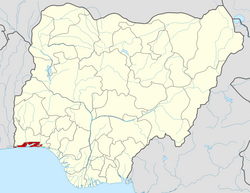This article needs additional citations for verification .(March 2016) |
Ikorodu | |
|---|---|
Municipality | |
| Ikorodu Local Government Area | |
 Downtown Ikorodu | |
 Ikorodu Shown within the State of Lagos | |
| Coordinates: 6°36′N3°30′E / 6.600°N 3.500°E | |
| Country | |
| State | Lagos State |
| LGA(s) | Ikorodu |
| Government | |
| • LGA Chairman | Adedayo Ladega |
| Area | |
| • Land | 345 km2 (133 sq mi) |
| Population (2006) | |
• Total | 536,619 |
| Time zone | UTC+1 (WAT) |
| Local language | Yorùbá |
 | |
Ikorodu is a city in Lagos State, Nigeria. [1] It is located to the north-east of Lagos, along the Lagos Lagoon and shares boundary with Ogun State. With a population of over 1 million inhabitants, Ikorodu is currently the 12th largest city in Nigeria and growing at a rate of 5.26% annually, it is projected to reach 1.7 million inhabitants by 2035, [2] [3] It is the 2nd largest local government in Lagos State. Indigenous settlers of Ikorodu emigrated from Sagamu and part of Ijebu in Ogun state. [4]

